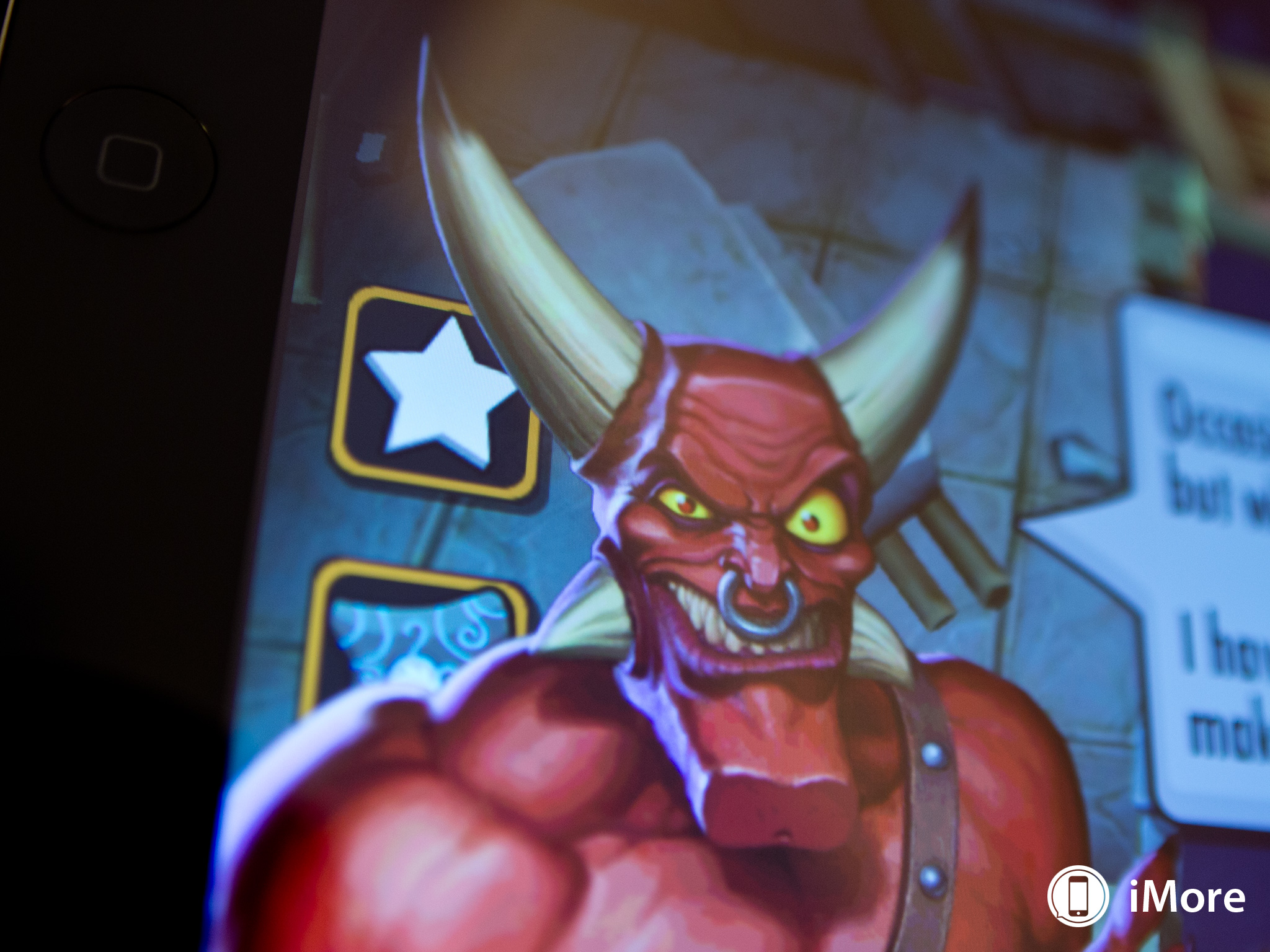PC gamers hate Dungeon Keeper mobile - here's why they should accept it

There's been a massive fiasco over the launch of EA's mobile iteration of Dungeon Keeper last week, primarily from old-school PC gamers that are downright disgusted at how a beloved franchise has been warped by the standards of the mobile economy. All of the usual freemium tropes are there: tasks such as building structures and training units are set on a real-world timer, which can be sped up with the expenditure of gems. Gems are acquired either through in-game achievements or, more commonly, with an outright purchase. The length of timers get progressively longer, adding more pressure to spend real money than wait for tasks to complete. The transition from a game about skill, strategy and timing to one about the amount of time you're willing to wait or money you're willing to spend is sharp, but there are reasons why things the way they are on mobile, and they don't entirely revolve around greedy developers using abusive models.
On the clock

There are some fair questions to be asked of mobile gaming by traditional PC and console gamers. "How can waiting be fun?" The short answer is, you're going to be waiting anyway. The data shows U.S. consumers spend an average of 50 minutes a day on mobile games, which, though significant, still leaves a lot of day leftover. Individual sessions are getting longer, but still average around 3 minutes. The old standard of sitting down for a minimum of a half hour to play something still doesn't quite hold water on mobile.
At the end of it all is a token reward with little intrinsic value other than the symbolic representation of time spent suffering.
Truly dedicated mobile gamers can juggle multiple timer-based free-to-play games for longer sessions, but most of them are happy to dive in whenever their notification tray says something is ready. The fact that you can't do much once you hit a timewall isn't a hugely restrictive factor under these circumstances, though one could argue that play times are so short because games have these limitations.
Paying to win

"How can paying your way through a task feel rewarding?" Traditional core gamers are used to tirelessly running after the proverbial carrot on a stick. They grind through challenges, failing over and over again to get to the end. They grit their teeth, try new strategies, get fed up, and come back for more. At the end of it all is a token reward with little intrinsic value other than the symbolic representation of time spent suffering. A good game, by many accounts, is a gruelling process. Surprise! Not everybody wants to go through that. Personally, I love the journey and couldn't have fun if I was just rewarded for showing up, but that's a lot to ask of someone who approaches gaming casually or otherwise has no gaming background.
Those players will happily trade in a buck for an hour of work in-game if there is some bauble, however superficial, to be gained so long as they're enjoying the experience. Core gamers would see this as cheating themselves out of the fun of a game (chasing the objective) while casual gamers only see acquiring the prize. Call them lazy or shallow if you like; they're having a good time, even if it's not the deep level of reward you might feel from a "real" game. Parallels to the pay-to-play model of yesteryear's arcades have been made. Though this breed of free-to-play is decidedly more "vampiric" than feeding a machine quarters out of good faith and plenty of vocal critics are opposing it, the current model has many players financially supporting games like Dungeon Keeper. These kinds of games have been around long enough and been successful enough that imagining them as any kind of deception is only valid if you're coming from PC gaming and you're not used to this sort of thing. Whether or not we should be used to it is really just a philosophical debate with little bearing on what actually ends up happening.
A rude awakening for PC gamers
The in-app purchases being employed in Dungeon Keeper are only new, unforgiving, and shocking to those that normally wouldn't touch mobile games with a ten-foot stylus, but were lured over by a revered, recognizable brand. The disconnect is especially clear when these players don't know how to budget their gems or straight-up haven't played the game on principle. I certainly agree with the critics that there are reasonable ways to employ in-app purchases that aren't nearly as predatory as Dungeon Keeper, but it's nothing we haven't seen before; players either take it or leave it.
The same moms that pour money into Candy Crush Saga aren't likely to appreciate the joy of beating the snot out of a little imp.
As noted elsewhere, using the Dungeon Keeper brand was a strategic misstep on EA's part because the demographics just don't line up. In short, the people old enough to appreciate Dungeon Keeper aren't the ones that keep IAP-driven games from being sustained. Conversely, the ones that can stomach IAP-ridden games aren't the ones to be tickled by Dungeon Keeper nostalgia. The same moms that pour money into Candy Crush Saga aren't likely to appreciate the joy of beating the snot out of a little imp, nevermind have previous experience with the original franchise. The teens who couldn't be bothered to wait for their stuff to finish building probably don't even know what a video card is, but they'll dig the humor Dungeon Keeper has to offer.
Master your iPhone in minutes
iMore offers spot-on advice and guidance from our team of experts, with decades of Apple device experience to lean on. Learn more with iMore!
The marketing spend required to sustain the free-to-play model is a big issue, and one can see in that light why EA was willing to sacrifice a high-value brand in the name of acquiring players, but the fact is, EA was setting themselves up to be burned by leveraging something so deeply cherished. Publishers should take note of this episode: only use established franchises if you can do the originals justice. Though this was the goal of the developer, their hands were tied once the business model was decided.
There's been a lot of talk in the wake of Dungeon Keeper surrounding the purity and goodwill of traditional game design, and pointing to War for the Overworld as an example of how to do the dungeon-digging game right. As great as War for the Overworld looks, it's got some major showstoppers, namely, it's not free, and it's not mobile. For hardcore gamers, those aren't problems, but for the wider (and potentially more lucrative) market, Dungeon Keeper is in a much better position. As for the abusive relationship between player and developer, it seems apt. Mobile gamers are fickle, and for them games are disposable. It would be great if I could trust a $6.99 iOS game to be worth it, and I'm not alone, but in an oversaturated market, it's no surprise we aren't seeing more premium-priced titles. Barriers need to be lowered if developers want to have any shot at winning a user's attention, as summed up nicely by Penny Arcade. The lack of any up-front cost reduces pressure early on and the familiarity bred over time (which is demanded by the game mechanics) can keep even the most casual mommy gamer playing for months.
Butchering a classic

Although I'm a through-and-through PC gamer and put a ton of time into one of Bullfrog's other games, Theme Hospital, I never got around to playing the original Dungeon Keeper titles. After all of this noise about how great the originals were, I'm more likely than ever to pick up a copy from Good Old Games and compare it to my experience with the mobile version I've been playing since the Canadian soft launch. The most troubling thing about this whole affair isn't that EA is doing something awful. That's no surprise. They're milking a franchise using a proven business model. Par for course. The bigger thing that's coming to light is that there's such vitriol from "hardcore" gamers towards what's happening on mobile.
The most I make from the critical backlash of Dungeon Keeper is that there are a lot of elitist gamers out there.
The high bar set by PC gaming by and large isn't being met on iOS, but we're talking about a different group of players and activity cycle. For better or worse, mobile players are talking with their wallets and supporting freemium. Nobody's putting a gun to their heads to buy gems or to leave glowing five-star reviews, despite devs using slippery tricks and continually needling them to buy gems.
When a freemium game's difficulty curve gets too high for my liking, I don't pay my way through it. There's this bizarre equation that a lot of critics make that they have to spend real money to play any of these freemium titles, as if waiting or leaving aren't options. If the wait gets too long, I uninstall and move to the next game. Maybe it's silly of me to assume more people have that sensibility, but it sure makes it hard to believe that developers are muscling their way to the top of the charts out of sheer coercion.

The most I make from the critical backlash of Dungeon Keeper is that there are a lot of elitist gamers out there that are pissed off that people have fun playing stupid, poorly-balanced games on their phones. We're talking about an ecosystem where a seemingly senseless game like Flappy Bird has miraculously launched itself to the top of the iOS charts. This isn't to say the entire mobile gaming populace are lazy drones that are willing to throw money at something rather than undergo a bit of labor to reach a feeling of accomplishment, but that does characterize a significant group and represents a new generation of gamers that wouldn't otherwise be active in the industry. To throw the games that they enjoy under the bus is to basically say "you're not good enough to be a 'real' gamer". I'm glad I'm not the only one who finds this reaction troubling. Mainstream mobile gamers aren't typically in-tune enough with online punditry to weather that particular storm, but that also means you likely aren't going to see a lot of them learning about the deeper issues or alternatives (or, conversely, defending F2P).
These are different use cases for different gamers with different expectations.
By all means, talk with your wallet and your reviews. If abusive free-to-play games actively nauseate you, go on a 1-star review spree, while simultaneously 5-starring every game that suits your tastes for business models. Better yet, pay up-front for games without in-app purchases. With any luck, these will sway the opinions of those unsure about what to play (though they may still be perfectly comfortable with the current standard of free-to-play) and send a clear message to developers. Ultimately, I think there's room for both the traditional game pricing and design structure on mobile, proven by successful ports of Bastion, Final Fantasy VI and XCOM to iOS, as well as super-accessible free-to-play games like Clash of Clans and Candy Crush Saga that appeal to the widest player base (and, some might say, the lowest common denominator). There's also little reason why these two types have to appeal to mutually exclusive audiences.
So let's leave the snobbery at the door. It's unrealistic to directly apply the standards of PC and console gaming to mobile. These are different use cases for different gamers with different expectations. I don't blame EA for making the game they did, because there's potential success there (though maybe less so after all of this criticism). They're doing what the invisible hand of capitalism does best. I also don't blame gamers for liking what they like, even if I'd rather spend cash up-front and skip the continual nagging. For those that would go so far as to call Dungeon Keeper mobile an anti-game, I can only say "get used to it". Sad? Maybe, but if players keep supporting the companies that employ timeblocks in their games, they'll keep getting made.
Follow along more of the freemium debate in our feature talking to developers at GDC 2014.
Editor-at-very-large at Mobile Nations, gamer, giant.
